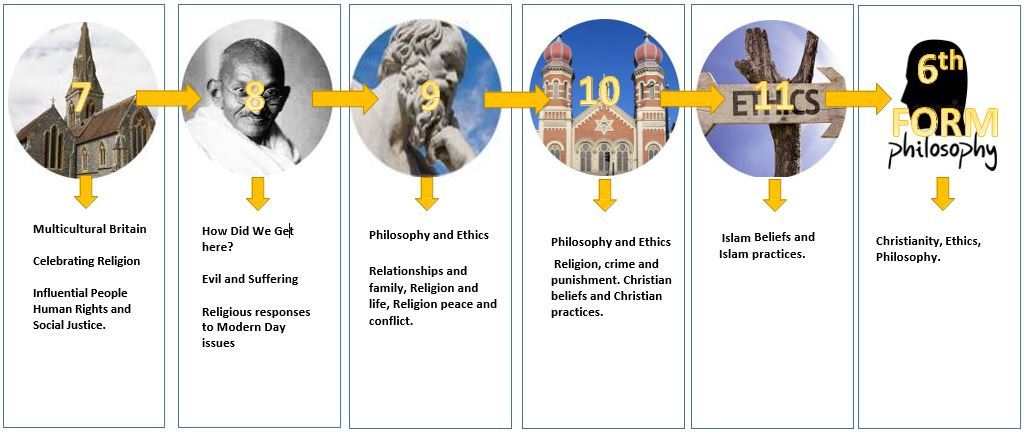- Home
- Secondary
- Subject Information
Religious Studies
BackIntroduction
Religious Studies at Tabor is about teaching tolerance and understanding. It's about preparing students and giving them the skill to flourish as able and qualified participants of a multi-cultural, multi-faith society.
Religious Education makes a distinctive contribution to the school curriculum by developing pupils' knowledge and understanding of religion, religious beliefs, practices, language and traditions and their influence on individuals, communities, societies and cultures. It enables pupils to consider and respond to a range of important questions related to their own spiritual development, the development of values and attitudes and fundamental questions concerning the meaning and purpose of life. The RE department at Tabor is a successful and dedicated team who are committed to student's enjoyment and development in Religious Studies.
Aims
Religious Studies at Tabor is about teaching tolerance and understanding. It is about preparing students and giving them the skills to flourish as able and qualified participants of a multicultural, multi-faith society. The Religious Studies department at Tabor is a dedicated team who are committed to the students’ enjoyment and development in this vital subject.

KS3
At Key Stage 3 pupils study a variety of different topics. We aim to create an inclusive environment so we aim to study the majority of the major world religions over Years 7 and 8 with an open and broad perspective.
In Year 7 we build on pupils' prior knowledge and study world religions as a foundation for their study in Year 8 and beyond. In year 9 pupils explore a variety of philosophical and ethical concepts while also beginning to develop exam skills in preparation for KS4.
In Year 7, we study the following:
-
Introduction to World Religions
-
Christianity
-
Sikhism
-
Buddhism
-
Citizenship
In Year 8, we take a more thematic approach, looking at topics from the perspective of different religions:
-
Islam
-
Rites of Passage
-
Religion and Social Justice
-
The Problem of Evil and Suffering
-
Citizenship
In Year 9, we then study the following:
-
Issues of Relationships
-
Issues of Good and Evil
-
Issues of Life and Death
-
Issues of Human Rights
-
Citizenship
KS4
The aim of GCSE Religious Studies is to teach pupils an understanding and evaluation of different religious beliefs and their impact in the world. Pupils are encouraged to develop their imagination and become aware of the spiritual dimension and the richness it can bring. We find it essential for pupils to learn about the community they live in and therefore Religious Studies is compulsory for all students until Year 11, where they will sit three papers focusing on Christianity, Islam and Philosophy and Ethics and following the EDUQAS exam board.
In Year 10, students will study Christianity for the first half of the year, covering topics that include:
-
The nature of God
-
Creation
-
Jesus Christ (incarnation, resurrection, atonement and teachings)
-
Afterlife
-
Forms of worship
-
Sacraments
-
Pilgrimage
-
Celebrations
-
Whether the UK is still a Christian country
-
The Church in the local community and the worldwide Church
During the second half of Y10, students will study Islam, covering topics that include:
-
The nature of Allah
-
Prophethood
-
Angels
-
Afterlife
-
The foundations of faith
-
The Five Pillars of Sunni Islam and Ten Obligatory Acts of Shi'a Islam
-
Jihad
-
Islamic festivals
In Year 11, students will study a range of philosophy and ethics topics, focusing mostly on Christianity and Islam, and also studying select topics from a Humanist and Atheist perspective.
Useful links
Revision guide
Useful websites for GCSE
- https://filestore.aqa.org.uk/resources/rs/specifications/AQA-8062-SP-2016.PDF
- www.reonline.org.uk (best for accurate info!)
- www.truetube.co.uk (great for revision videos)
- www.re-definitions.org.uk (knowledge and key terms)
The following websites support all ages KS3 / 4
- http://www.reonline.org.uk/
- Watching the news regularly
- Crash Course is a YouTube channel started by John and Hank Green in association with PBS. It features videos on You Tube covering different aspects of Philosophy.
- https://www.youtube.com/user/crashcourse
- A History of Ideas from the BBC Radio 4 programme is another collection of videos on YouTube. The series answers big questions answered and explains big theories in under 2 minutes from the BBC Radio 4 programme – A History of Ideas. The videos were scripted by philosopher Nigel Warburton. https://www.youtube.com/playlist?list=PLLiykcLllCgPE0q9BiMexLFj-1rq9GUwX
- https://www.huffingtonpost.co.uk/news/teenagers
- https://www.firstnews.co.uk/
- https://www.ted.com/playlists/86/talks_to_watch_with_kids
- Google Classroom


